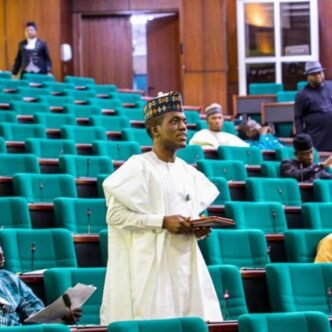HB. 1512– A BILL FOR AN ACT TO AMEND THE PROVISIONS OF THE CONSTITUTION OF THE FEDERAL REPUBLIC OF NIGERIA, 1999 (AS AMENDED) TO MOVE WATER FOR DOMESTIC, COMMERCIAL, INDUSTRIAL, IRRIGATION, POWER, AND OTHER USES TO THE CONCURRENT LEGISLATIVE LIST, TO ALLOW STATE GOVERNMENTS TO PUT TO SUSTAINABLE USE WATERS WITHIN THEIR STATE MAKE PROVISION FOR STATE GOVERNMENTS TO ACCESS MINES IN THEIR STATES, PROVIDE FOR THE FINANCIAL AUTONOMY OF LOCAL GOVERNMENT COUNCILS BY PRESCRIBING AN INDEPENDENT CONSOLIDATED LOCAL GOVERNMENT COUNCIL ACCOUNT AND FOR OTHER RELATED MATTERS. Bill Sponsored by Hon. Ikeagwuonu Onyinye Ugochinyere & 33 Others. Bill Progress: Committee Stage
This Bill seeks to amend the Constitution of the Federal Republic of Nigeria 1999 (As Amended) to move water for domestic, commercial, industrial, irrigation, power, and other uses to the Concurrent Legislative List, to allow State Governments to put to sustainable use waters within their State, make provision for State Governments to access mines in their States.
The Bill also seeks to provide for the financial autonomy of Local Government Councils by prescribing an independent consolidated Local Government Council account and for related matters.
Nigerian House of Representatives Advances HB. 1512 Constitutional Amendment Bill
The Nigerian House of Representatives is currently considering HB. 1512, a bill aimed at amending the Constitution of the Federal Republic of Nigeria, 1999 (as amended). If enacted, this bill could significantly alter the distribution of powers within Nigeria’s federal system.
One of the most significant proposed changes in HB. 1512 is the transfer of water resources from the Exclusive Legislative List to the Concurrent Legislative List. Under the current arrangement, water resources, particularly major basins and interstate waters, are exclusively legislated by the Federal Government. The bill seeks to allow state governments to enact laws regarding “Water for Domestic, Commercial, Industrial, Irrigation, Power, and Other Uses.” This change is expected to enable state governments to manage their water resources more effectively, fostering more sustainable usage that meets the specific needs of local populations.
Another key provision of the bill aims to grant state governments greater access to mineral resources located within their borders. Under the current framework, mining is predominantly under the jurisdiction of the Federal Government. Allowing states to regulate and benefit from mining activities within their regions could promote economic growth and enhance local development initiatives.
Financial autonomy for local government councils is also a focal point of HB. 1512. The bill proposes the establishment of an independent Consolidated Local Government Council Account, which seeks to address longstanding issues of financial dependence and limited autonomy in local government administration. This provision could empower local councils to manage their finances more effectively, enhancing governance and service delivery at the grassroots level.
In addition to these primary provisions, the bill includes various incidental and related matters to support its main objectives.
As of March 26, 2025, HB. 1512 has successfully passed its Second Reading in the House of Representatives. This indicates that the general principles of the bill have been debated and approved by the House, allowing it to advance to the committee stage. Here, it will undergo more detailed scrutiny, and amendments may be introduced prior to further voting.
The potential implications of HB. 1512 are substantial. If passed into law, the bill could lead to increased resource control for states, enhancing their economic empowerment and enabling them to pursue localized development initiatives. Additionally, granting financial autonomy to local governments aligns with calls for stronger grassroots governance and improved local service delivery.
However, the process for amending the Nigerian Constitution is rigorous. It requires approval by a two-thirds majority in both the Senate and the House of Representatives, followed by ratification from two-thirds of the State Houses of Assembly. As discussions around HB. 1512 continue, stakeholders will be closely monitoring its progress and potential impact on the nation’s governance structure.













